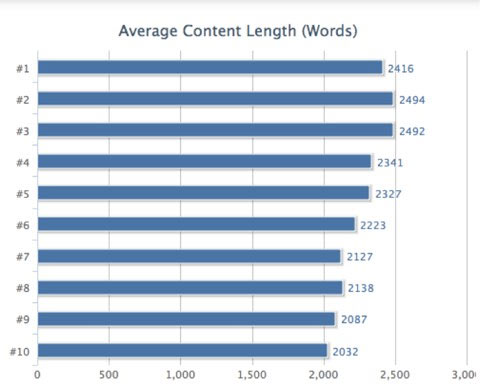SEO
Want Your Blog Posts Rank in Google’s First Page? Write 2,000-word Posts!
7th February 2013Okay – I was bummed. As I am trying really hard to get my blog posts go beyond 1,000 words, I read Neil Patel’s article telling me that Google respects web pages with more than 2,000 words each. It is an interesting post and I would like to share with you my own findings.
You should read Neil’s post yourself – but here’s some lessons learned, spiced with my first-hand experience…
Longer content equals higher search engine rankings!
It’s official: Based on the research done by SerpIQ (shared by Neil Patel) on 20,000 keyword variations, on average, the Top 10 ranked web pages are those with more than 2,000 words in length. The longer your content, the better your ranking.

Via QuickSprout
However, please note, providing authoritative content is mandatory – i.e. your story how you save dogs and puppies and find them good homes is admiring, but without you offering additional “shareable” content, such as “practical tips on how to find the right homes for your dogs” or tips on “how train your dogs so they are becoming ‘balanced’ ones to attract more adopters”, you won’t likely to rank high on search engines.
Google loves long content BECAUSE your readers love yours
It seems that Google strongly consider long content – especially those over 2,000 words in length. So, it would be easy to rank high, right? Just write a 2,000-word article and there you go – you will get ranked higher! Yay!
Um, I’m sorry I have to burst your bubble, but Google is not stupid. Google algo considers many factors, with heavy emphasis on content quality. How it detects quality? One signal is social shares.
2,000-word article with full of cr@p won’t get yours rank high; search engine bots might not be that smart, but you can’t trick your readers. If your content is useful, you’ll get buzzed; if yours suck, you’ll get nothing but bad rep.
If you write outstanding and authoritative 2,000-word content, your readers will likely to share yours on their social networks, as well as linking to your content from their own blogs. Those are the reasons why Google ranks a longer page higher than shorter ones.
You need to boost your social media efforts, too!
I hate to relate social media efforts as a way to get your website ranked higher, but to be blunt, your social media effort counts; your personal and business social pages ARE impacting the way your web pages ranked in search engines.
Having a 2,000-word web page is not guaranteed to get your page ranked higher on Google. IN ADDITION to that, you need to have an active social media accounts with plenty of followers who will “evangelize” your cool web pages. Without them, you lack the leverage needed to get your content to be exposed to as many eyeballs as possible.
I remember writing a pillar article on one of my blogs – it’s 3000-word long, and although I understand it drives away some readers, I think it would be great on social media – and eventually, will help the blog post ranks high.
I failed. The article is pretty good, but it lacks sharers and buzzers. I was dumbfounded; but now I know – the blog has very little followers on Facebook and Twitter. The blog branding is weak; the traffic is also weak. The page is nowhere to be found in 2-3 search engine result pages for the targeted keyword.
So, again, a long, interesting content is good for your site, but if you are not able to bring it to many people to read and share, you will lose a chance to get the social media quantifiable sharing values – e.g. the number of Likes, +1’s, tweets.. – as well as “link-magnet” values – e.g. people linking from their sites to yours because yours is too cool to be missed.
Takeaway
So, there you go – 3 lessons I learn from Neil Patel on how to get ranked high on Google by writing long posts. I hope you can benefit from my recap, and be sure to read Neil’s post as it’s a darn good one.
(Well this post is 700-ish words in length – so maybe it won’t get ranked on Top 10 😀 … but I take Neil’s advice not to blabber with my post, so there you go… I hope this is useful enough for you to share to everybody 🙂 )
Do you agree with the 2,000-word content rule? Please share your own observation with regard to post length’s impact on Google ranking.
Photo credit: Johannes P Osterhoff via photopin cc
